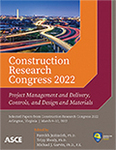Optimization of Multi-Skilled Labor with the Application of Partial Allocation of Resources
Publication: Construction Research Congress 2022
ABSTRACT
The current practice of labor allocation in construction assumes single-skilled workforce; meaning that each worker is assumed to be skilled in one trade. In such practice, at any instance in the project lifecycle, some of the activities may be delayed due to the unavailability of a certain type of workforce that is engaged in other activities. Due to the inefficiencies of these solutions, some research discussed the idea of “multi-skilled” labor, where some of the workers may have enough training to carry out different activity types. Yet, the literature falls short in providing a robust multi-skilling framework; specifically, one that solves the problem of partial allocation of labor. Unlike all the previous multi-skilling research, the implementation of partial allocation enables secondary resources to be deployed at any day of the activity’s duration as opposed to only allocating resources that are idle during the full duration of said activity. The objective of this research is to develop a framework for optimizing the allocation of multi-skilled labor in construction projects by allowing partial allocation. The novelty of the presented methodology is that it allows for partial allocation, which further minimizes the idle times of labor when compared to a conventional multi-skilled labor allocation model. With the use of genetic algorithms, the model was applied to a case study, where the results did not only show a reduction in idle labor days, but also shifted the histogram’s end point to the left, reducing some activities’ durations and hence reducing the total project duration.
Get full access to this article
View all available purchase options and get full access to this chapter.
REFERENCES
Abotaleb, I., Moussa, M., and Hussain, S. (2014). Optimization of Allocating Multi-Skilled Labor Resources Using Genetic Algorithms. Halifax, NS: CSCE 2014 General Conference.
Arashpour, M., Wakefield, R., Abbasi, B., Arashpour, M., and Hosseini, R. (2017). Optimal Process Integration Architectures in Off-site Construction: Theorizing the Use of Multi-skilled Resources. Architectural Engineering and Design Management, 14(1-2), 46–59.
BCA, B. a. (2016). Multi-skilling Scheme for Construction Industry. Building and Construction Authority.
Bittel, R., and Trepo, G. 1979. The Starting-up of a New Plant Organized in Multi-skilled Production Groups.
Burleson, R. C., Haas, C. T., Tucker, R. I., and Stanley, A. 1989. Multiskilled Labor Utillization Strategies in Construction. Journal of Construction Engineering and Management, 124(6), pp. 480–489.
Carley, L. A., Haas, C., Borcherding, J., and Goodrum, P. (2003). Experiences with Multiskilling Among Non‐union Craft Workers in US Industrial Construction Projects. Engineering, Construction and Architectural Management, 10(6), 374–381.
Cross, M. (1986). Multiskilling Brings Cost and Productivity Benefits. Process Engineering, 72(11), 51–53.
Florez, L. (2017). Crew Allocation System for the Masonry Industry. Computer-Aided Civil and Infrastructure Engineering, 32(10), 874–889.
Gomar, J., Haas, C., and Morton, D. (2002). Assignment and Allocation Optimization of Partially Multi-skilled Workforce. Journal of Construction Engineering and Management, 128(2), 103–109.
Haas, C., Rodriquez, A. M., Glover, R., and Goodrum, P. (2001). Implementing a Multiskilled Workforce. Construction Management and Economics, 19(6), 633–641.
Hegazy, T., Shabeeb, A. K., Elbeltagi, E., and Cheema, T. 2000. Algorithm for Scheduling with Multi-skilled Constrained Resources. Journal of Construction Engineering and Management, 126(6), pp. 414–421.
Ho, P. (2016). Labour and Skill Shortages in Hong Kong’s Construction Industry. Engineering, Construction and Architectural Management, 23(4), 533–550.
Hottenstein, M., and Bowman, S. (1998). Cross-training and Worker Flexibility: A Review of DRC System Research. The Journal of High Technology Management Research, 9(2), 157–174.
Liu, M., and Ortsman, O. 1979. Developing New Forms of Work Organization in a New Chemical Plant in France.
Liu, S.-S., and Wang, C. J. 2007. Optimization Model for Resource Assignment Problems of Linear Construction Projects. Automation in Construction, 16(4), pp. 460–473.
Liu, S.-S., and Wang, C.-J. 2012. Optimizing Linear Project Scheduling with Multi-skilled Crews. Automation in Construction, Volume 24, pp. 16–23.
MOM, M. o. (2016). Recognising Workplace Safety and Health (WSH) Competencies. Ministry of Manpower.
Moselhi, O., and Alshibani, A. 2007. Crew Optimization in Planning and Control of Earthmoving Operations using Spacial Technologies. ITcon, 12(2), pp. 121–137.
Pagano, S., and Heathcote, K. (2003). Education of Self Taught Building Contractors. Construction Research Congress (pp. 1–7). Reston, VA: ASCE.
Pollitt, D. (2010). Construction Companis Build Skills for the Future. Training and Management Development Methods, 24(1), 515–518.
Srour, I., Haas, C., and Morton, D. (2006). Linear Programming Approach to Optimize Investment in the Construction Workforce. Journal of Construction Engineering and Management, 132(11), 1158–1166.
Treleven, M. (1989). A Review of the Dual Resource Constrained System Research. IIE Transactions, 21(3), 279–287.
Wang, Y., Goodrum, P., Haas, C., and Glover, R. (2009). Analysis of Observed Skill Affinity Patterns and Motivation for Multiskilling among Craft Workers in the U.S. Industrial Construction Sector. Journal of Construction Engineering and Management, 135(10), 999–1008.
Information & Authors
Information
Published In
History
Published online: Mar 7, 2022
Authors
Metrics & Citations
Metrics
Citations
Download citation
If you have the appropriate software installed, you can download article citation data to the citation manager of your choice. Simply select your manager software from the list below and click Download.
